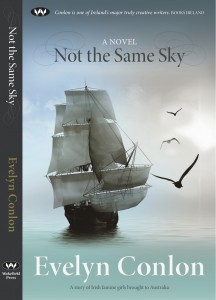Sydney played host this weekend (23-25 August) to the 5th International Famine Commemoration, marking the occasion with a dinner, a seminar and the annual gathering at the monument to the Great Irish Famine in the grounds of the Hyde Park Barracks. Previously, the event has been held in Toronto (2009), New York (2010), Liverpool (2011) and Boston (2012). The guest of honour was the Irish Arts and Heritage Minister Jimmy Deenihan, who is the chair of the Irish National Famine Commemoration Committee.
The Great Famine (1845-52) had a profound impact on Ireland, which is still felt today, not the least in the fact that population has never recovered to the pre-famine level of 8 million 170 years ago. By the early 1850s a million had died and a million emigrated. The draining of Ireland’s population continued for a century afterwards, with the population declining to about 4 million in 1940.
But Ireland’s loss was the world’s gain with the émigrés settling in various countries around the world, including Australia. In particular, Australia received just over 4000 single young women, most of whom were teenaged orphans. These “famine orphans” are the focus of the annual commemorations at the Hyde Park Barracks, where many of them were housed when they first arrived in this new and strange land. Much has been written about the famine orphans, but a recently-published book, which I had the privilege of launching at the seminar on Saturday, provides an intimate insight into what these young women experienced. (Click here to read my launch speech.)
Not the Same Sky by Evelyn Conlon, one of Ireland’s foremost novelists and short story writers, tells the story of a group of orphan girls, who, recruited from workhouses and given the “choice” of emigration or starvation, came to Australia on the Thomas Arbuthnot in 1850. Although Not the Same Sky is a work of fiction it is based on thorough historical research. In launching the book, I observed:
Grounded in detailed research, in part it reads like history. But it is much more than that. Historians are constrained by the facts as they find them. A novelist, while still being faithful to the essential facts, can go that one step further using imagination to elaborate, embellish and entertain; to bring raw facts to life; to vest the characters with a humanity that brings them closer to us. As an accomplished novelist and short story writer, Evelyn does this brilliantly, tapping into our emotions as we follow the progress of the orphan girls’ on their journeys.
The time and place of the novel’s launch could not have been better for Not the Same Sky is a fitting tribute to the orphan girls that bridges the temporal gap of understanding to bring them to life for us, complementing the evocative monument which stands in the grounds of the Hyde Park Barracks.
The Great Irish Famine Commemoration Committee and, in particular, its chair Dr Perry McIntyre, are to be congratulated on what was a truly memorable weekend of commemoration and celebration for Irish Australia.
Not the Same Sky (Wakefield Press 2013, RRP $24.95)
